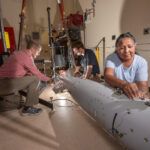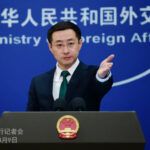Could a nuclear-armed Iran be contained?
By Kingston Reif | April 18, 2013
On September 4, 1962, President John F. Kennedy released a statement in response to intelligence reports of a Soviet arms buildup in Cuba. Kennedy said the United States did not have evidence “of the presence of offensive ground-to-ground missiles; or of other significant offensive capability either in Cuban hands or under Soviet direction and guidance.” However, he warned, “Were it to be otherwise, the gravest issues would arise.”
On September 4, 1962, President John F. Kennedy released a statement in response to intelligence reports of a Soviet arms buildup in Cuba. Kennedy said the United States did not have evidence "of the presence of offensive ground-to-ground missiles; or of other significant offensive capability either in Cuban hands or under Soviet direction and guidance." However, he warned, "Were it to be otherwise, the gravest issues would arise."
Of course, the next month Kennedy found out that the Soviet Union was in fact deploying offensive missiles and nuclear warheads in Cuba, prompting a deep crisis that brought the planet within a hair's breadth of nuclear catastrophe. Historian Michael Dobbs writes that Kennedy later regretted making his September statement, as "[h]e was compelled to take action, not because Soviet missiles on Cuba appreciably changed the balance of military power, but because he feared looking weak."
Fast forward 50 years to March 4, 2012. In a high-profile speech to the American Israeli Public Affairs Committee (AIPAC), President Obama declared: "Iran's leaders should understand that I do not have a policy of containment; I have a policy to prevent Iran from obtaining a nuclear weapon." Obama reiterated this position last month to Israeli students in Jerusalem: "Iran must not get a nuclear weapon. This is not a danger that can be contained, and as President, I've said all options are on the table for achieving our objectives."
Might Obama, like Kennedy, later regret issuing such an ultimatum? If Iran cannot be peacefully convinced to curtail its nuclear program, the president could soon be faced with a hugely consequential decision: attack Iran in an attempt to prevent it from acquiring nuclear weapons, or recognize that it could do so and embrace deterrence and containment instead. By staking American credibility on a policy of prevention at all costs, Obama may end up believing he has to choose war. But he would be wrong, because deterrence (threatening devastating retaliation) and containment (blunting the spread of Iranian power and influence) may in fact be more prudent than preventive attack.
During its first term the Obama administration pursued a mix of diplomatic engagement, biting sanctions, and covert action to stem the progress of Iran's nuclear program. To date, these measures have isolated and put unprecedented pressure on the ruling regime but have not prevented Tehran from continuing to produce 20-percent-enriched uranium, which is not suitable for weapons but is more highly enriched than what is needed for nuclear power reactors. Nor has US policy stopped Iran from adding more advanced centrifuges to its underground enrichment facility at Fordow.
Obama has rightly argued that there is still time for a diplomatic solution; after all, the US intelligence community's assessment is that Iran has not made a political decision to acquire nuclear weapons and is not yet capable of producing an effective arsenal. Diplomatic talks on Iran's nuclear program — involving Tehran and the United States, Russia, China, Britain, France, and Germany — resumed in 2012 after a two-year hiatus, but they have not reached a breakthrough.
At what point might President Obama consider preventive military action? One obvious impetus would be if Iran were to withdraw from the Nuclear Non-Proliferation Treaty, kick inspectors from the International Atomic Energy Agency (IAEA) out of the country, and begin to enrich its uranium to weapons-grade levels. However, this is the least probable of all the courses Iran might choose, since it carries the greatest risk of a US attack.
Another possible catalyst would be if Iran were to try to produce weapons-grade uranium at an undeclared facility and secretly restart the dedicated nuclear weapons program it disbanded in 2003. But Iran would likely fear that Western and Israeli intelligence services could detect these efforts, just as they detected its uranium enrichment efforts at both Natanz and Fordow. Moreover, there is no evidence that Iran is yet constructing additional secret facilities, or that its supreme leader, Ayatollah Ali Khamenei, is seeking a mad dash to the bomb.
A dilemma more likely to confront the president is that in the absence of a diplomatic resolution, Iran may continue to accumulate 20 percent enriched uranium and install more advanced centrifuges at its nuclear facilities. This would give it the option to rapidly produce enough weapons-grade uranium for a handful of bombs. If Tehran pursues this course, the United States might not be confident it could detect — and therefore stop in time — an Iranian effort to begin developing nuclear weapons. Some experts believe that by the middle of 2014, Iran will have enough 20-percent-enriched uranium to further process into several bombs' worth of weapons-grade uranium.
If the president confronts one of the above scenarios, military action against Iran's nuclear program might be justified, but it's not clear that the costs would outweigh the benefits. A military attack could damage or destroy Iran's nuclear facilities and signal US resolve to allies. But it could also lead to Iranian retaliation against US and Israeli military forces and civilians, spark a larger regional war, and prompt a rise in oil prices that could destabilize the global economy. Most ominously, unless a US attack eliminated the current regime, it would only delay, not destroy, Iran's nuclear program, while increasing Tehran's determination to build a nuclear arsenal to ward off such attacks in the future.
In other words, a US attack would eventually lead to a scenario that required the very policy of deterrence and containment the president says is unacceptable.
Given the costs of military action, deterrence and containment could be a less costly way to reduce the threat posed by a prospective nuclear-armed Iran. The United States has successfully deterred China from using nuclear weapons, and is currently pursuing a deterrence and containment regime against North Korea.
If Iran were to acquire nuclear weapons, Washington could make it clear to Tehran that using them or transferring them to non-state actors would be met with devastating retaliation. To prevent further proliferation in the region, the United States could pledge to defend its allies if they are attacked by Iran with nuclear weapons. And it could strengthen economic sanctions and build a regional coalition to further surround and isolate Tehran from the rest of the world. As Colin Kahl has written, this would deny Iran the benefits it might hope to achieve via nuclear weapons, such as enhanced security and greater influence in the Middle East. Washington is already pursuing elements of this approach.
This is not to downplay the terrible costs that would accrue if Iran were to cross the nuclear threshold. While Iran could likely be deterred from conducting nuclear attacks or deliberately transferring weapons or material to proxies like Hezbollah, the mere possession of nuclear weapons might embolden it to behave more aggressively. Some argue that nuclear weapons have provided Pakistan and North Korea with a shield behind which they have engaged in more frequent provocations against India and South Korea, respectively. In addition, an Iranian Bomb would increase the risk of any low-level conflict with Tehran escalating to the nuclear level. It would also damage the credibility of the global nonproliferation regime, and could prompt other states in the Middle East to try to acquire their own nuclear weapons.
Despite these dangers, nuclear weapons have proven to be far better instruments of deterrence than conquest. Furthermore, Iran's current foreign policy is already provocative and aggressive without nuclear weapons. And historically, fears that one nation's acquisition of nuclear weapons would lead to massive proliferation have been overstated.
In short, a strategy of deterrence and containment should be seen as a serious and plausible means of dealing with a nuclear-armed Iran.
Of course, the best option — better than a preemptive attack or a nuclear-armed Iran — would be a diplomatic solution to the current impasse. During the Cuban Missile Crisis, President Kennedy went to great lengths to find an alternative to war, on one hand, or accepting Soviet nuclear weapons in Cuba, on the other. He succeeded. President Obama must also vigorously pursue a diplomatic escape route, even if that means making difficult compromises that become fodder for domestic political attacks. There's still time, but the clock is ticking.
Together, we make the world safer.
The Bulletin elevates expert voices above the noise. But as an independent nonprofit organization, our operations depend on the support of readers like you. Help us continue to deliver quality journalism that holds leaders accountable. Your support of our work at any level is important. In return, we promise our coverage will be understandable, influential, vigilant, solution-oriented, and fair-minded. Together we can make a difference.
Topics: Columnists, Nuclear Weapons















